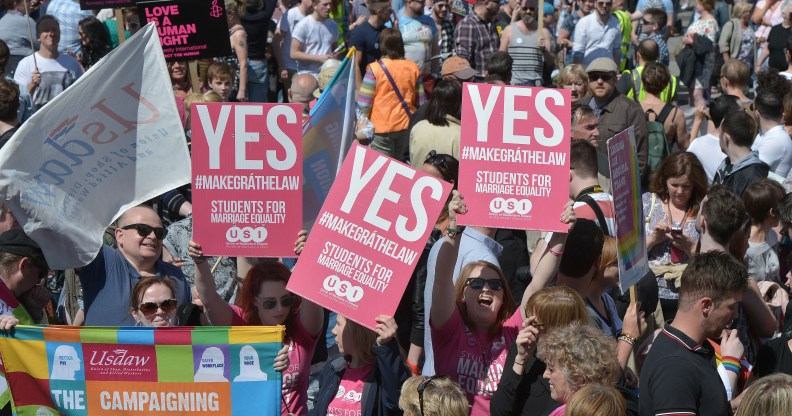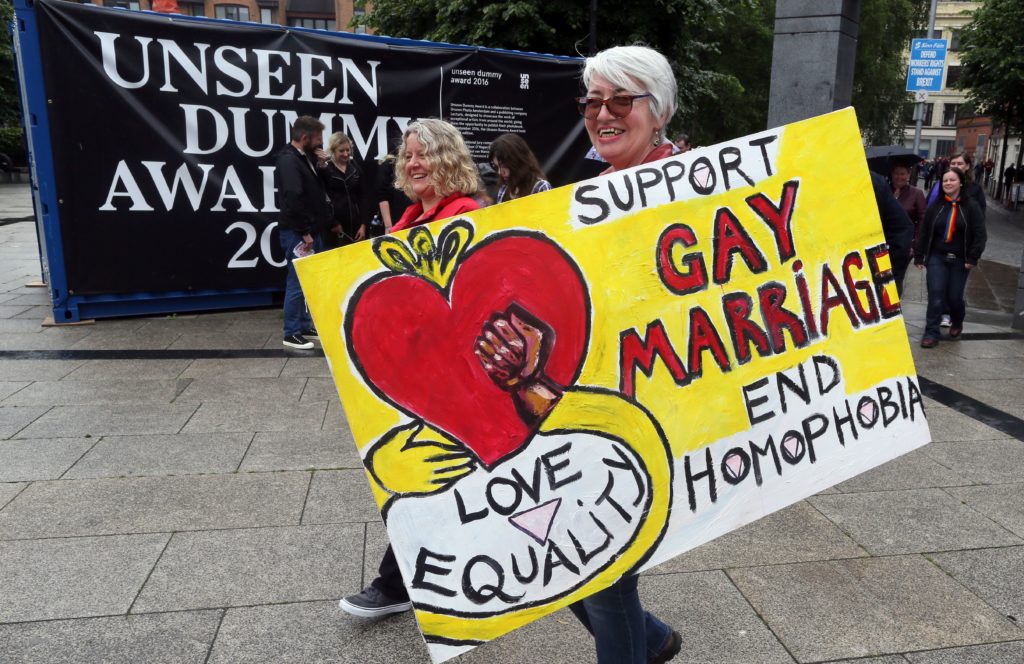MPs vote for equal marriage in Northern Ireland

Thousands marched for same-sex marriage on June 13, 2015 in Belfast, Northern Ireland. (Charles McQuillan/Getty)
Northern Ireland could finally be given marriage equality after MPs overwhelmingly voted for a pro-LGBT+ amendment to the Northern Ireland Bill.
In an historic decision, the House of Commons voted 383-73 in favour of a clause to extend same-sex marriage to Northern Ireland, tabled by Labour MP Conor McGinn.
The clause will require secondary legislation, and will only come into force if power-sharing talks fail to restore devolution by October 21.
Should the Stormont executive become functional by this deadline, the amendment will become void.
DUP MP said that marriage equality would undermine devolution
MPs including the Democratic Unionist Party (DUP)’s Ian Paisley had argued against the amendment before Tuesday’s (July 9) vote, claiming that it would undermine Northern Ireland’s devolved parliament.
McGinn rebutted those claims by reminding MPs that the assembly voted in favour of marriage equality in November 2015, only for the decision to be overturned by the DUP using a petition of concern veto.
“Far from usurping the assembly I am acting on a mandate from the assembly when it voted in favour of equal marriage,” he said.
He suggested that the move could serve as an “incentive” for Northern Ireland’s parties to come to an agreement after a two-and-a-half-year impasse, and warned the house against “failing” Northern Ireland’s LGBT+ community.
“This house has failed LGBT people in Northern Ireland before,” he said.
“It failed a generation of people in Northern Ireland by not decriminalising homosexuality and condemned them to discrimination, to abuse and to living in fear many years after that stopped to be the case in the rest of the UK.
“It failed people in Northern Ireland by not extending same-sex marriage when it became the law here making people in Northern Ireland less valued than the rest of us.”
I don’t think it’s good enough for government ministers to offer warm words about equality.
Labour MP Ged Killen, one of the signatories on the amendment, gave a rousing speech in which he admitted that the question of marriage equality is one close to his heart.
“This is personal for me, being that I am married to an Irishman and our marriage is not recognised where he is from,” he said.
“We can get on a plane in Glasgow as married men and arrive n Belfast as civil partners, despite having never left the UK.
“It’s been a great source of frustration and at times bemusement that for the last two years I’ve had to content with the DUP talking about how much they don’t want to see any regulatory divergence between Northern Ireland and the rest of the UK.”

LGBT+ rights campaigners march through Belfast against the ban on same-sex marriage. (Getty)
Killen turned his criticism to the government, accusing it of being an “obstacle” rather than an ally, and comparing its refusal to act to the state’s adoption of Section 28.
“Being an LGBT+ ally means action,” he continued. “I don’t think it’s good enough for government ministers to stand at the dispatch box and offer warm words about equality.
“No one is in any doubt that the government is perfectly, legally entitled to introduce same-sex marriage in Northern Ireland–it is just refusing to do so.”
Both Labour and Conservative MPs were given a free vote on the amendment.
Penny Mordaunt was one government minister to support the clause, tweeting shortly after the result was announced that she was “proud to have supported this amendment which passed with a majority of 310.”
“Every citizen of the UK should be able to marry who they love,” she added. “The fact that people in Northern Ireland have been unable to has torn at the social fabric of our country.”
Before the vote Northern Ireland minister John Penrose confirmed that the government would honour the results, but warned that the legal complexities might mean that it take longer than the three months left before the October 21 deadline.
“Should this pass it will go into law,” he said. “It will become part of primary legislation. And so ministers will be bound by it and the government will proceed.”
MPs also voted to extend abortion rights to citizens of Northern Ireland by 332 to 99. Again, this clause will only come into effect should Stormont fail to become functional again.
Northern Ireland without devolution since 2017
The Northern Ireland Executive collapsed in January 2017 after Sinn Fein’s Martin McGuinness resigned as deputy first minister.
Under Northern Ireland’s power-sharing agreement, the roles of first minister (typically held by the DUP) and deputy (Sinn Fein) can only function with each other’s full support.
With McGuiness’ resignation and Sinn Fein’s subsequent refusal to replace him, the entire system collapsed.
Multiple attempts to restore the executive have since failed, with the issue of marriage equality said to be a major sticking point.
According to Colum Eastwood, leader the Social Democratic and Labour Party (SDLP), the petition of concern is the “number one issue” preventing a deal.
Speaking at the PinkNews Belfast Summer Reception in June, he said: “We can’t allow this veto to exist. It has to be fixed and it has to be fixed now.”
Amnesty International’s Northern Ireland director and part of the Love Equality coalition Patrick Corrigan said: “This is an incredible moment and a huge cause for celebration. Marriage equality in Northern Ireland is finally a reality.
“For more than five years, same-sex couples in the rest of the UK have been able to get married whilst this right has been denied to citizens in Northern Ireland.
“Now, in just three months’ time, we could see the first same-sex couples here tying the knot. So many people have been campaigning for this for so long. At points it seemed unachievable, but we never gave up.
“Today’s a day for the history books.”

